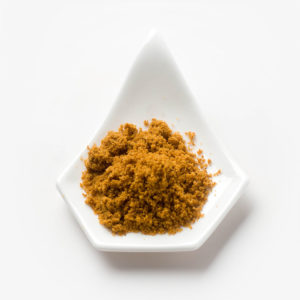Mace is the outer layer of the nutmeg seed. It has a lighter, more delicate flavor.
Contents
Uses
- Often used in dishes because it imparts a nice orange hue to dishes.
- It can be used in anything from curries, sweets, to cosmetic products.
Benefits
- Digestive Health: Mace has long been used to treat digestive woes such as nausea, diarrhea, stomach spasms and gas. A common mixture known to ease indigestion, gas and nausea is a tea made of slippery elm bark, mace and nutmeg which are combined with cream and boiled, then drank when lukewarm. A popular treatment for diarrhea, according to Chinese and Indian medicine, is to place 3 drops of the essential oil of mace/nutmeg on a sugar cube and swallow it after the oil has seeped in. If a capsule is preferred, one 200mg capsule can be taken twice per day until the diarrhea subsides.
- Treatment and Prevention of Cancer: A study published in the April 2012 issue of the “Asian Pacific Journal of Tropical Medicine” showed the essential oil of mace/nutmeg can help treat, and possibly prevent, cancer by inhibiting the formation of blood vessels that feed cancerous tumors. A study published in the April 2012 issue of the “Journal of Food Science” showed the compound myristicin to inhibit the growth of colon cancer cells.
- Alleviates Anxiety and Depression: Mace also offers mild anti-anxiety and sedative properties. In a report published in the Spring 2006 issue of the “Journal of Medicinal Food”, mace was shown to exert significant anti-depressant effects. Researchers made the conclusion that these affects arise from the activation of the neurotransmitters dopamine and serotonin.
- Pain Relief: Mace has been used for centuries in Chinese medicine as a topical pain relieving massage oil. A few drops of the essential oil mixed with an ounce of a carrier oil, such as olive or grapeseed, then massaged onto the affected area, can provide relief from many ailments: muscle pain, arthritis, aching joints, bruises and sores.
- Breath Freshener: Mace is highly effective at combating bad breath because of its antibacterial properties. By adding a very slight pinch to your toothbrush when brushing your teeth, it can destroy the bacteria that cause bad breath.
Cautions
- Mace can interfere with the way the body metabolizes certain medications, especially those that are broken down and changed by the liver. This can result in prescription medications not responding properly and possible causing detrimental side effects.
- For women who are pregnant or breastfeeding, dosages of mace higher than that which is found in food can be detrimental. It has been linked with miscarriages and birth defects. Although there is not enough research to determine the effects on nursing babies, it is advised to not use mace until the child is completely weaned.
- When used in large amounts, mace can cause the following: stomach pain, dry mouth, nausea, vomiting, thirst, dizziness, seizures, hallucinations and even death.
Interactions
n/a
Other names
Myristica Fragrans
References
Source: Herbswisdom, http://www.herbwisdom.com/herb-mace.html
Organicspices, http://www.organicspices.com/organicspicesgallery/organic-mace
Image source: https://static1.squarespace.com

